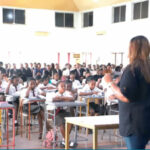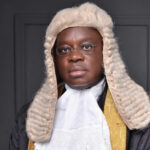At 50, Dr. Adedoyin Aguoru is an associate professor, an accomplished academic, a remarkable playwright, scholar of international repute, President of African Association for Japanese Studies (AAJS) and the Director of the Centre for Excellence in Teaching and Learning (CETEL), University of Ibadan. In this interview with YEJIDE GBENGA-OGUNDARE, she speaks on her scholarship, feminism, peculiar challenges of women and education in Nigeria.
Would you describe yourself as a feminist, considering your presentation of characters in the recent drama text, Stolen Seeds?
Feminism and being feminist are broad terminologies. I strongly identify with the authentic tenets of the feminist ideology, which I have been privileged to engage professionally, though definitely not as identity politics. I, in my recent reflections, have concluded that when a woman is perceived as being able to achieve certain goals and or make a living, she is seen as a feminist. I have neither carried a feminist tag nor thought it critical to do so in my personal life and through my career or as a playwright. Being an authentic woman and scholar has always been sufficient for me. I, therefore, was not thinking of a theoretical perspective when I wrote the play. The role-play, particularly for the categories of women portrayed, was sociological and psychological: the mother, the sisters-in-law, the friend, the wife, the daughter and the alternative wife.
Still on feminism, it would be stating the obvious that the gender gap in the academia is far from close in terms of female representation. What is your take on this?
The gender gap is indeed wide. This is understandable because building a career in academics requires a lot of concentration which equals time and lot of time. An average female may be unwilling or unable to create the time that is required for sustained periods of concentration which is the major tool of trade in the academia. The limitation arises from the roles females are physiologically created to play and the social and cultural obligations they are expected to fulfil. The way most societies still construct ideas of femaleness and femininity is also another factor.
All the same, in comparison to when I began my career as an academic, there has been much more female representation and there will be more in the years to come. Several scientific bodies globally have created female research circles and continue to evolve strategies to make consistent and permanent change that ought to eventually bridge the gap.
As current director of the Centre for Excellence in Teaching and Learning (CETEL), what are some factors you think can help better the Nigerian education sector generally?
They are funding, research and development. The conversation is and will continue to be an ongoing one. Education is a social security which a nation owes its citizens on one hand and education is a legacy which parents owe their children.
I have always been curious about the posture of the citizenry, particularly the Nigerian student and the average parent of the Nigerian student on education as social security. Both parties, the leaders and the citizenry as stakeholders, need to prepare to have sincere and honest conversations on how education will be funded in the country.
What’s the next big thing to expect from you in terms of literary creativity?
Oh well, just doing my stuff as helped by God. She; a trans-border play on transnational crime, anti-money laundering and terrorist funding campaign, came out a few months ago. It is different from the earlier plays. I think I will continue to do my stuff. I look forward to painting; I had imagined that I would do some painting in my 40s.
Why are you particularly interested in the Japanese literary tradition?
It would interest you that I had watched Asian films as a child. I saw Chinese, Japanese and Indian films which were also very popular then. Shogun, produced from a Japanese classic was also a popular one playing on several television stations.
My fascination with narratives on the Second World War in particular sustained my interest in the causes of conflicts that trigger war. When it was time for my dissertation, I had the good fortune of being assigned to Professor Jide Owoeye, who had taught us a course on War and Strategic Studies. I would later find out that Professor Owoeye was an expert in Japanese studies.
At what point did you begin to teach Japanese literature? Was it on the curriculum?
Shortly after I completed the M.I.R degree, I was assigned two courses to teach in my place of work: Alternative Traditions to Prose Fiction and Alternative Traditions to Poetry. The courses interestingly centred on teaching literature from other parts of the world besides dominant parts of Europe and America and all of Africa. It centred on Latin America, Eastern Europe, Czech, Slovak and China, Japan and parts of Asia.
In those classes I began to expand my experiments from the international relations school to the literary traditions of these counties. When I commenced work on my doctoral thesis my supervisor wanted me to expand my scope beyond the biocritical work I had begun on Soyinka… He had encouraged me to carry out a biocritical study of a successful playwright, performer and film maker. While putting up the proposal it struck me that I could compare him with a Japanese playwright, performer and film maker who had similar interests and whose output was comparable to his.
What can you say about the growth of the African Association for Japanese Studies and the impact of your mentoring across the continent?
Well, it has been quite a journey. The management of the University of Ibadan where I work has been very positive about the association. The first colloquium was held in the University of Ibadan. We were planning a closed event where concept notes that cut across STEM and the Social Sciences and the Humanities had been submitted. The Vice Chancellor of the university then, Professor Idowu Olayinka, had been in conversation with the Japanese Ambassador to Nigeria who also had planned to visit the university. It was in the nick of time, so our first ever event was graced by the Ambassador of Japan to Nigeria who also noted that that was his first official assignment in Nigeria.
We had the second full blown conference hosted by Lead City University in Ibadan; we had a really rewarding time as an association at those meetings and at the mid-year meetings that took place virtually.
READ ALSO FROM NIGERIAN TRIBUNE
WATCH TOP VIDEOS FROM NIGERIAN TRIBUNE TV
- Relationship Hangout: Public vs Private Proposals – Which Truly Wins in Love?
- “No” Is a Complete Sentence: Why You Should Stop Feeling Guilty
- Relationship Hangout: Friendship Talk 2025 – How to Be a Good Friend & Big Questions on Friendship
- Police Overpower Armed Robbers in Ibadan After Fierce Struggle






